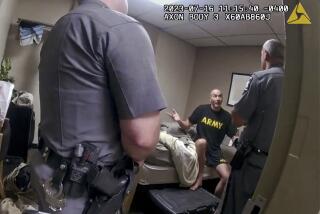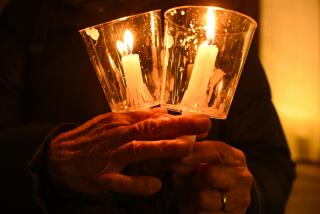Author and former Marine David Morris on PTSD, ‘American Sniper’
David Morris’ experiences as a former Marine infantry officer and an embedded reporter in Iraq brought him up close to the horrors of war, the ghosts of which hounded him into the treatment offices of the Veterans Affairs Department and beyond. Currently, the self-described semi-hipster writer spends his days pursuing his own brand of therapy, out on a surfboard or kicking it in the coffee shops of Portland, Ore. His compulsively readable book, “The Evil Hours: A Biography of Post Traumatic Stress Disorder,” explores PTSD from a personal perspective as well as in a larger cultural and historical context. He took time out from his book tour to discuss trauma, transcendence and why “American Sniper” ain’t all that.
“Biography” is an interesting word choice for the subtitle. I’ve only ever heard it used for people.
The problem I had with stories about PTSD in the media was that they tended to just recite the symptoms over and over again. There’s more to the symptoms — there’s a story behind them. Thinking of a disorder as a creature with its own intelligence, its own dream life, its own alternative existence, that was really interesting to me. Because if it’s a person, you can say: Where did it come from? Where was it born? What were its influences? Where is it going? What brought it to maturity?
Is PTSD one thing, with a specific cause and a particular set of symptoms, or does it exist on a spectrum?
First and foremost, it’s a disorder that’s listed in the DSM [the Diagnostic and Statistical Manual of Mental Disorders]. Until it was entered into the DSM, it was just this idea that had been bouncing around the heads of some Vietnam veterans. I look at the diagnosis as a starting point and not an end point. PTSD is also an extension of what human memory does under stress, which gets you into a twilight zone of where does PTSD end and a healthy response to trauma begin. That’s a line that I’m unwilling to draw.
You write, “For most of trauma history, determining trauma has been the preserve of artists, poets, and shamans.” How does “American Sniper” fit into that tradition?
I can’t say enough negative things about it. No one’s questioning Chris Kyle’s competence and heroism, but his racist sentiments to me are shameful and embarrassing. I know a lot of Marines who felt a completely different response to Arab culture and taught themselves Arabic. His death was a real tragedy, but his book was also a real tragedy, and I think the movie just shows that Americans are not ready to have an adult conversation about the war yet.
Clint Eastwood and Bradley Cooper openly admitted the movie was a western. I have no patience for people who want to misapply the John Wayne trope to the Middle East. That’s one of the reasons we ended up there. We had a cowboy president who led us into a stupid war and acted like it was going to be the OK Corral. When it was anything but. I can say all these things because I have veteran Teflon.
What is post-traumatic growth?
It’s a new avenue of inquiry that’s not really popular. I was initially offended by the prospect of it because it seemed sort of silly, insulting: “Just grow!” But as I read into it, I saw that the growth theme is something that’s not encouraged enough. It suggests that there are opportunities to find transcendence, and understanding and insight in the wake of almost dying. Post-traumatic stress and post-traumatic growth are not mutually exclusive.
I still think about my IED and the echoes of that. When something like this happens to you, everyone is looking at you and saying, “What’s he going to do next?” So you can use that as an opportunity to say, “Well, I’m going to change my life.”
In your personal story, you say that when you began to reconcile yourself with your own PTSD, you had a “dream that died.” What took its place?
I had been a Marine infantry officer. I thrived on extremity and exertion, and I thought of danger as being intrinsically meaningful and transcendent. You watch people die, and you get sick of it. You get tired of people not learning from their mistakes. In terms of what’s replaced it, I guess in some ways my desire to be more OK with the great indoors — me being slightly more domestic and more of a Portland semi-hipster writer. This book was my saying goodbye to my older version of myself.
What do you think are the most effective therapies for trauma?
I think books like “Slaughterhouse Five” and “The Things They Carried” and “The Lovely Bones” are strong medicine.
If someone doesn’t have any major substance abuse problems but has hyper-vigilance, has war nightmares, and they’re struggling to connect with their girlfriend, doing CPT— cognitive processing therapy — is very helpful. It’s kind of light lifting. I don’t think it’s really going to give you any great revelations, but it will help you step back and evaluate some of the inner thoughts and feelings you have about what happened to you. And then doing some sort of mindfulness meditation therapy, possibly a Zoloft, possibly Prazosin to get the nightmares under control. In the absence of any other data, I think yoga is non-invasive; it’s a good starting point.
It’s never just one therapy. If you treat it like strep throat you’ll get limited results, because PTSD is built on the impacts to every aspect to your person.
For me, surfing helps, specifically Sunset Cliffs [in San Diego]. Just being in nature and contextualizing yourself with the ocean as this immortal force, this elemental force, that was something that helped me.
More to Read
Sign up for our Book Club newsletter
Get the latest news, events and more from the Los Angeles Times Book Club, and help us get L.A. reading and talking.
You may occasionally receive promotional content from the Los Angeles Times.






